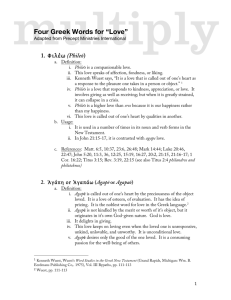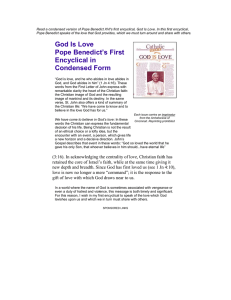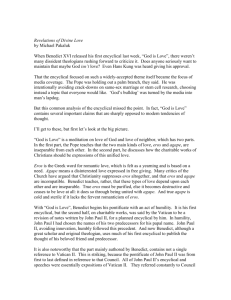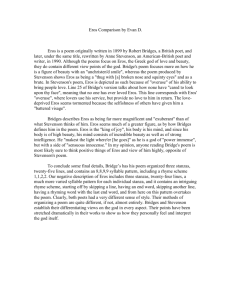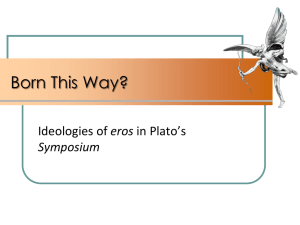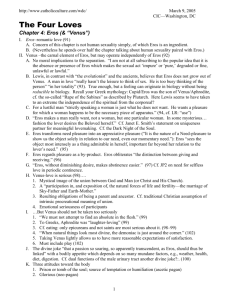GOD IS LOVE
advertisement
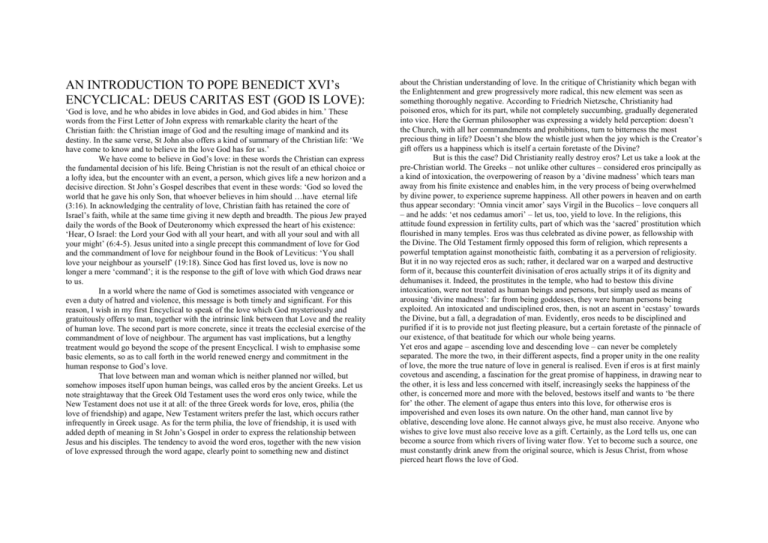
AN INTRODUCTION TO POPE BENEDICT XVI’s ENCYCLICAL: DEUS CARITAS EST (GOD IS LOVE): ‘God is love, and he who abides in love abides in God, and God abides in him.’ These words from the First Letter of John express with remarkable clarity the heart of the Christian faith: the Christian image of God and the resulting image of mankind and its destiny. In the same verse, St John also offers a kind of summary of the Christian life: ‘We have come to know and to believe in the love God has for us.’ We have come to believe in God’s love: in these words the Christian can express the fundamental decision of his life. Being Christian is not the result of an ethical choice or a lofty idea, but the encounter with an event, a person, which gives life a new horizon and a decisive direction. St John’s Gospel describes that event in these words: ‘God so loved the world that he gave his only Son, that whoever believes in him should …have eternal life (3:16). In acknowledging the centrality of love, Christian faith has retained the core of Israel’s faith, while at the same time giving it new depth and breadth. The pious Jew prayed daily the words of the Book of Deuteronomy which expressed the heart of his existence: ‘Hear, O Israel: the Lord your God with all your heart, and with all your soul and with all your might’ (6:4-5). Jesus united into a single precept this commandment of love for God and the commandment of love for neighbour found in the Book of Leviticus: ‘You shall love your neighbour as yourself’ (19:18). Since God has first loved us, love is now no longer a mere ‘command’; it is the response to the gift of love with which God draws near to us. In a world where the name of God is sometimes associated with vengeance or even a duty of hatred and violence, this message is both timely and significant. For this reason, l wish in my first Encyclical to speak of the love which God mysteriously and gratuitously offers to man, together with the intrinsic link between that Love and the reality of human love. The second part is more concrete, since it treats the ecclesial exercise of the commandment of love of neighbour. The argument has vast implications, but a lengthy treatment would go beyond the scope of the present Encyclical. I wish to emphasise some basic elements, so as to call forth in the world renewed energy and commitment in the human response to God’s love. That love between man and woman which is neither planned nor willed, but somehow imposes itself upon human beings, was called eros by the ancient Greeks. Let us note straightaway that the Greek Old Testament uses the word eros only twice, while the New Testament does not use it at all: of the three Greek words for love, eros, philia (the love of friendship) and agape, New Testament writers prefer the last, which occurs rather infrequently in Greek usage. As for the term philia, the love of friendship, it is used with added depth of meaning in St John’s Gospel in order to express the relationship between Jesus and his disciples. The tendency to avoid the word eros, together with the new vision of love expressed through the word agape, clearly point to something new and distinct about the Christian understanding of love. In the critique of Christianity which began with the Enlightenment and grew progressively more radical, this new element was seen as something thoroughly negative. According to Friedrich Nietzsche, Christianity had poisoned eros, which for its part, while not completely succumbing, gradually degenerated into vice. Here the German philosopher was expressing a widely held perception: doesn’t the Church, with all her commandments and prohibitions, turn to bitterness the most precious thing in life? Doesn’t she blow the whistle just when the joy which is the Creator’s gift offers us a happiness which is itself a certain foretaste of the Divine? But is this the case? Did Christianity really destroy eros? Let us take a look at the pre-Christian world. The Greeks – not unlike other cultures – considered eros principally as a kind of intoxication, the overpowering of reason by a ‘divine madness’ which tears man away from his finite existence and enables him, in the very process of being overwhelmed by divine power, to experience supreme happiness. All other powers in heaven and on earth thus appear secondary: ‘Omnia vincit amor’ says Virgil in the Bucolics – love conquers all – and he adds: ‘et nos cedamus amori’ – let us, too, yield to love. In the religions, this attitude found expression in fertility cults, part of which was the ‘sacred’ prostitution which flourished in many temples. Eros was thus celebrated as divine power, as fellowship with the Divine. The Old Testament firmly opposed this form of religion, which represents a powerful temptation against monotheistic faith, combating it as a perversion of religiosity. But it in no way rejected eros as such; rather, it declared war on a warped and destructive form of it, because this counterfeit divinisation of eros actually strips it of its dignity and dehumanises it. Indeed, the prostitutes in the temple, who had to bestow this divine intoxication, were not treated as human beings and persons, but simply used as means of arousing ‘divine madness’: far from being goddesses, they were human persons being exploited. An intoxicated and undisciplined eros, then, is not an ascent in ‘ecstasy’ towards the Divine, but a fall, a degradation of man. Evidently, eros needs to be disciplined and purified if it is to provide not just fleeting pleasure, but a certain foretaste of the pinnacle of our existence, of that beatitude for which our whole being yearns. Yet eros and agape – ascending love and descending love – can never be completely separated. The more the two, in their different aspects, find a proper unity in the one reality of love, the more the true nature of love in general is realised. Even if eros is at first mainly covetous and ascending, a fascination for the great promise of happiness, in drawing near to the other, it is less and less concerned with itself, increasingly seeks the happiness of the other, is concerned more and more with the beloved, bestows itself and wants to ‘be there for’ the other. The element of agape thus enters into this love, for otherwise eros is impoverished and even loses its own nature. On the other hand, man cannot live by oblative, descending love alone. He cannot always give, he must also receive. Anyone who wishes to give love must also receive love as a gift. Certainly, as the Lord tells us, one can become a source from which rivers of living water flow. Yet to become such a source, one must constantly drink anew from the original source, which is Jesus Christ, from whose pierced heart flows the love of God.



